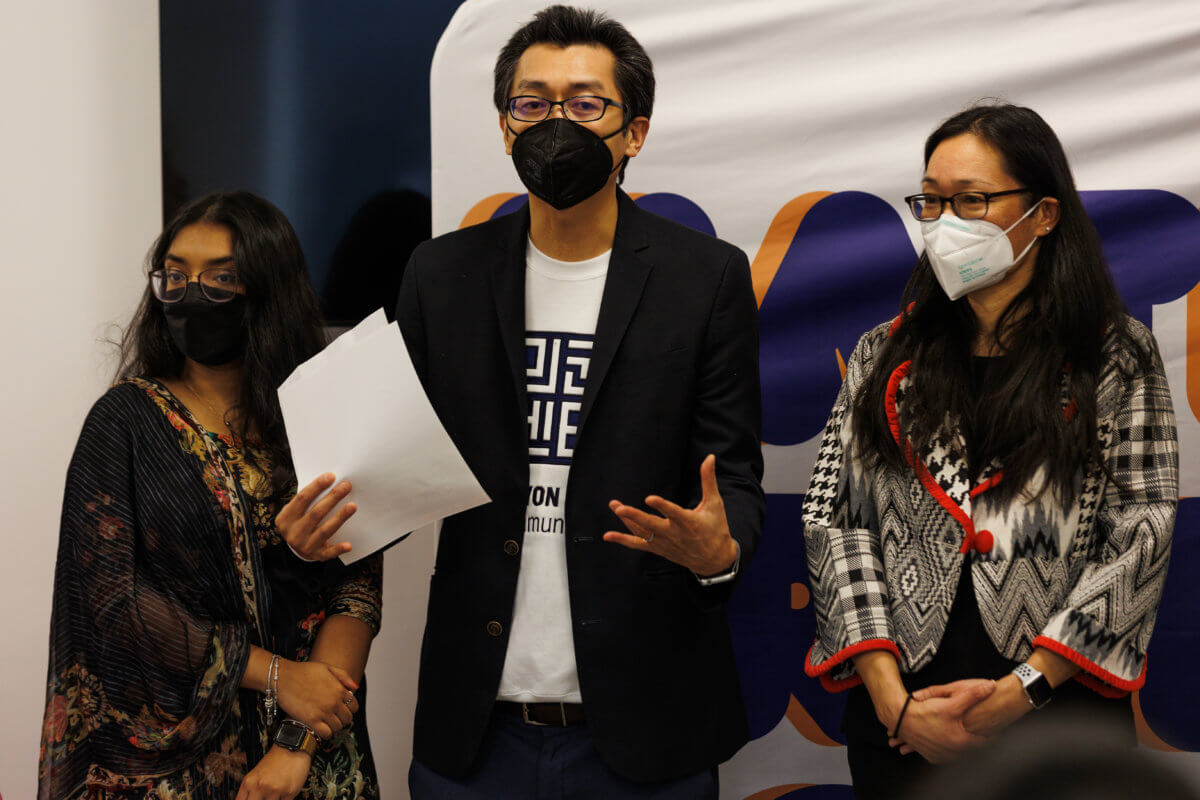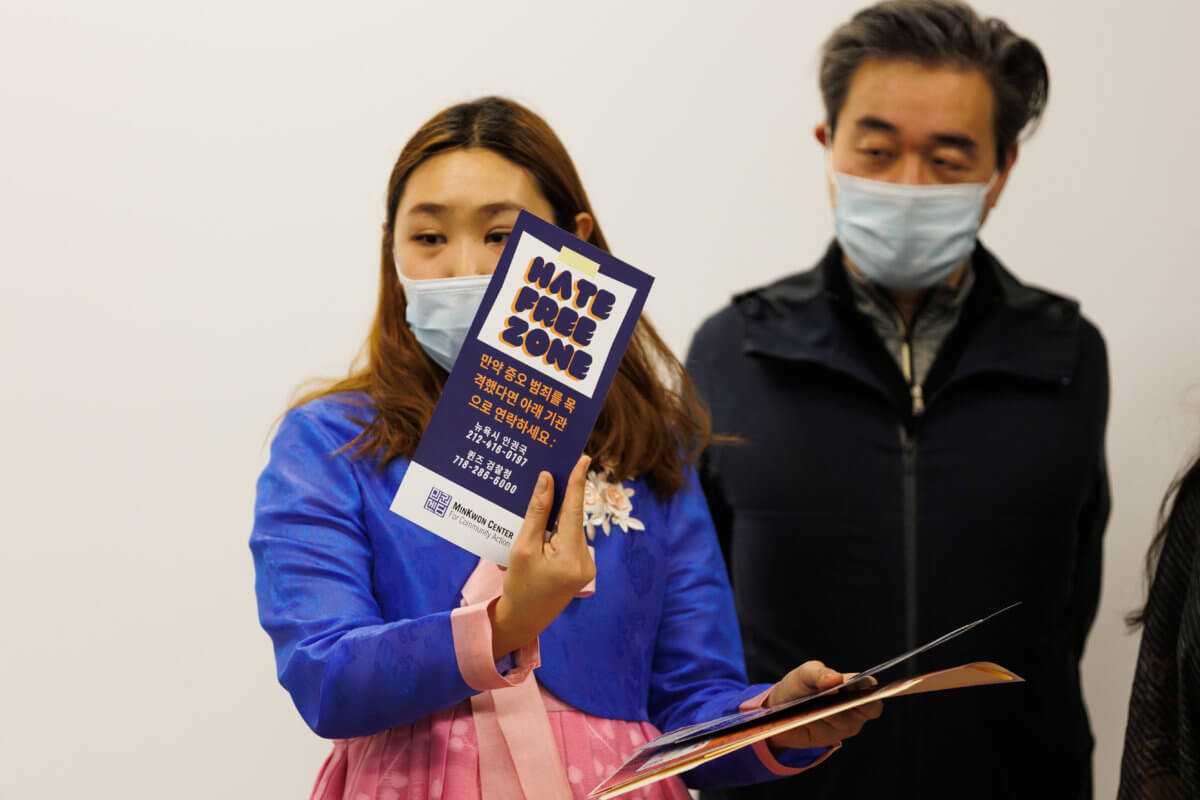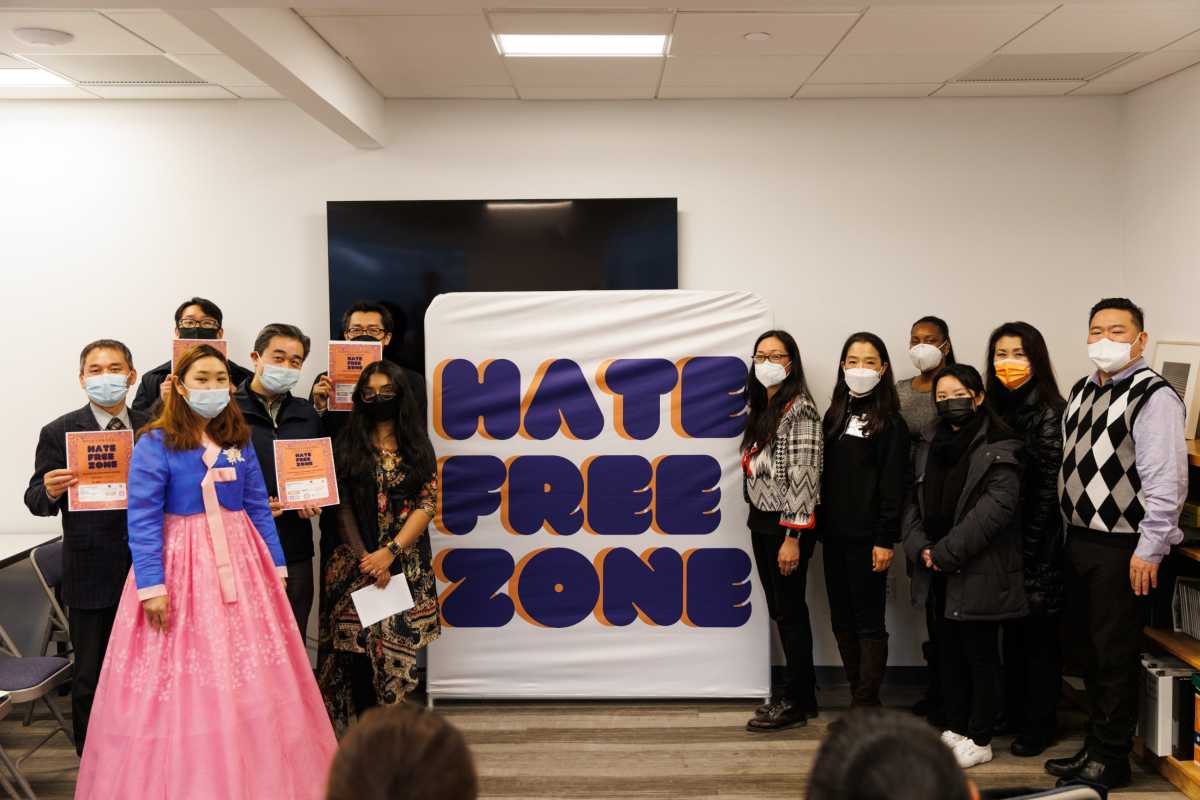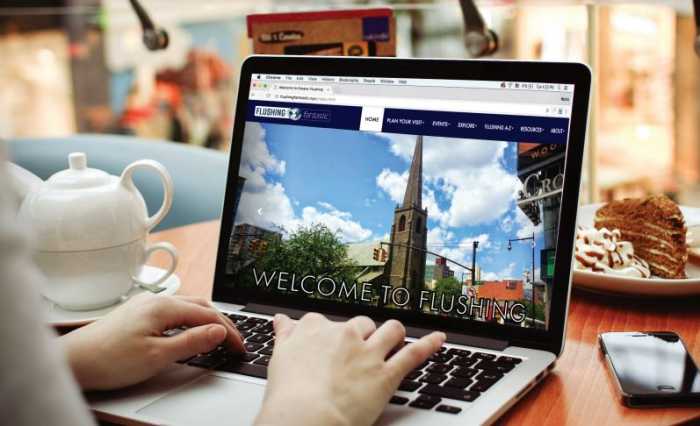In light of increased anti-Asian attacks in New York City, the MinKwon Center for Community Action, in partnership with the Greater Flushing Chamber of Commerce and other community organizations, launched a new campaign on Thursday, Feb. 4, to create safe spaces in the community. As part of the campaign, the center will host “Know Your Rights” sessions on immigration, housing and safety.
The Hate Free Zones will work alongside small businesses in Flushing and other community organizations that provide support to the Asian American and Pacific Islander (AAPI) community to create sanctuary spaces. Plus, the campaign will begin conversations about what it means to re-open Flushing the “right way,” after the ongoing COVID-19 pandemic devastated small businesses.
The project aims to create an inclusive, welcoming Flushing community as a direct counter to the xenophobia that has been directed toward the AAPI community.
According to John Park, executive director of the MinKwon Center, the rise in violent hate crimes against the AAPI community is a citywide, statewide and nationwide issue that has spiraled out of control with no lack of accountability. The solution, Park says, is coming together as a community to combat hate.

“If you can’t do it through policy, you have to do it by shifting the needle of a culture of a community, and activate our members,” Park said. “In this new Lunar New Year, the Year of the Tiger, we are going to move ahead in a different way, and build back in a different way, but in the right way, and because Flushing is an international community, we have that legacy of our commitment to always protect those who are vulnerable or are at risk of prosecution. We are going to continue that commitment.”
The MinKwon Center and the Greater Flushing Chamber of Commerce, along with its partners, will launch a pledge campaign and a visibility campaign while targeting at least 20% of Flushing businesses to participate in the Hate Free Zone initiative. The center will also distribute “Know Your Rights” brochures to business owners to display on their windows and in their stores. The posters and brochures are translated into English, Chinese, Korean, Bangla and Spanish.

Many small business owners who may have experienced hate or have witnessed a verbal or physical assault, will learn how to provide safety and report an incident, said Jennifer Sun, co-executive director of Asian Americans for Equality (AAFE).
“It starts with each of us in the community, building these relationships and breaking the isolation,” Sun said.
John Choe, executive director of the Greater Flushing Chamber of Commerce, said the message is clear: Hate has no place in Flushing.
“We stand for Black Lives Matter, our Latino neighbors are important and Asian American hate is something we all must oppose,” Choe said. “In 1657, the people of Flushing rose up against the authoritarian rule of Peter Stuyvesant, who told them to persecute Quakers and other religious minorities. It was the people here in Flushing who said, no we have our rights, and we will protect our brothers and sisters regardless of whether they’re Muslim, Jewish or Christians — welcome them with love and open arms.”
Hailie Kim, a Sunnyside resident and housing organizer for the MinKwon Center, said she hopes that other communities will use Flushing’s new Hate Free Zone as a model for their own, after recalling an incident that took place several weeks ago while she was heading to work.
“A man was screaming about the shape of East Asian people’s eyes and this was around the time when we couldn’t go a day without another member of our AAPI community being attacked,” Kim said. “I was hoping he would outpace me.”
Growing up in Sunnyside, Kim said she had developed a naive sense of safety, while her parents were always alert while walking outside.
While walking to a cafe last summer, Kim recalled an Asian man who approached her saying an individual was shouting racial slurs at him.
“He said, ‘Let me walk you past him because he’s right there.’ That was the moment where I felt like my very safe, loving community was starting to see some of this,” Kim said.
In a separate incident that occurred five years ago, Kim’s mother, a nail technician, was verbally attacked by a woman while going to meet with a client on the Upper East Side of Manhattan.
“She would dread commuting to work in the morning because that woman would follow her and harass her and shout racial slurs,” Kim said.
Tasnia Muskan, a CUNY student who immigrated from Bangladesh to the U.S. in 2015, said her first experience with hate crime and discrimination happened long before coming to America. Muskan’s uncle, a Muslim man who had no relation to terrorists from the Middle East, escaped the U.S. in January 2002, unable to bear the discrimination following the 9/11 World Trade Center attacks.
“I never understood the connection at the time of him being a Muslim and the terrorists being Muslim and why that made him give up on his dream of building a life for his family,” Muskan said. “At the time I thought of him as cowardly until I moved to the U.S. and was called a member of ISIS by the people I call friends on a daily basis.”
According to Muskan, such racial, religious and cultural discrimination has unfortunately become a constant in every immigrant’s life, whether it be through direct physical harm, or indirect judgment, neglect and discrimination.
“Like my community, most of the South Asian communities in New York, including my own mother and myself, choose not to wear our cultural clothing, because of the fear of people on the streets, store employees and people in the workplace that won’t take us seriously, or think we are uneducated and are new to the country and don’t know anything,” Muskan said. “We embrace our western clothing and culture as a shield against the world, while simultaneously crushing our own identities and values, not to mention slowly diminishing the cultural identities of the future generation. “
With the recent spike in hate crime discrimination, Muskan reiterated that it’s important for communities to support each other and stand in solidarity, a message that community leaders and local elected officials have echoed at past rallies in support of Black and brown, Jewish and Asian communities.
In a statement state Senator John Liu said the fight against hatred and discrimination is not going to simply fade away and requires a daily commitment from everyone to stay vigilant, educated and committed to living a society that embraces diversity as a strength and virtue.
“Here in Queens, we are among the most diverse communities in the entire world. So what better place to start the battle against hatred and discrimination than here and now?” Liu said. “So we’re here in Flushing to say that enough is enough. The responsibility is on all of us, no matter our race, color or creed, to stand up, speak up and fight back in the name of all New Yorkers.”
Newly elected Councilwoman Sandra Ung said she is hopeful in the creation of the Flushing Hate Free Zone.
“This will bring a diverse community together, to support and protect one another. To denounce and deject those who seek to divide and hurt the community through bigotry and racism. Hate has no place in Flushing,” Xing Ying Wu, a community liaison, said on behalf of Ung at the press conference.

































